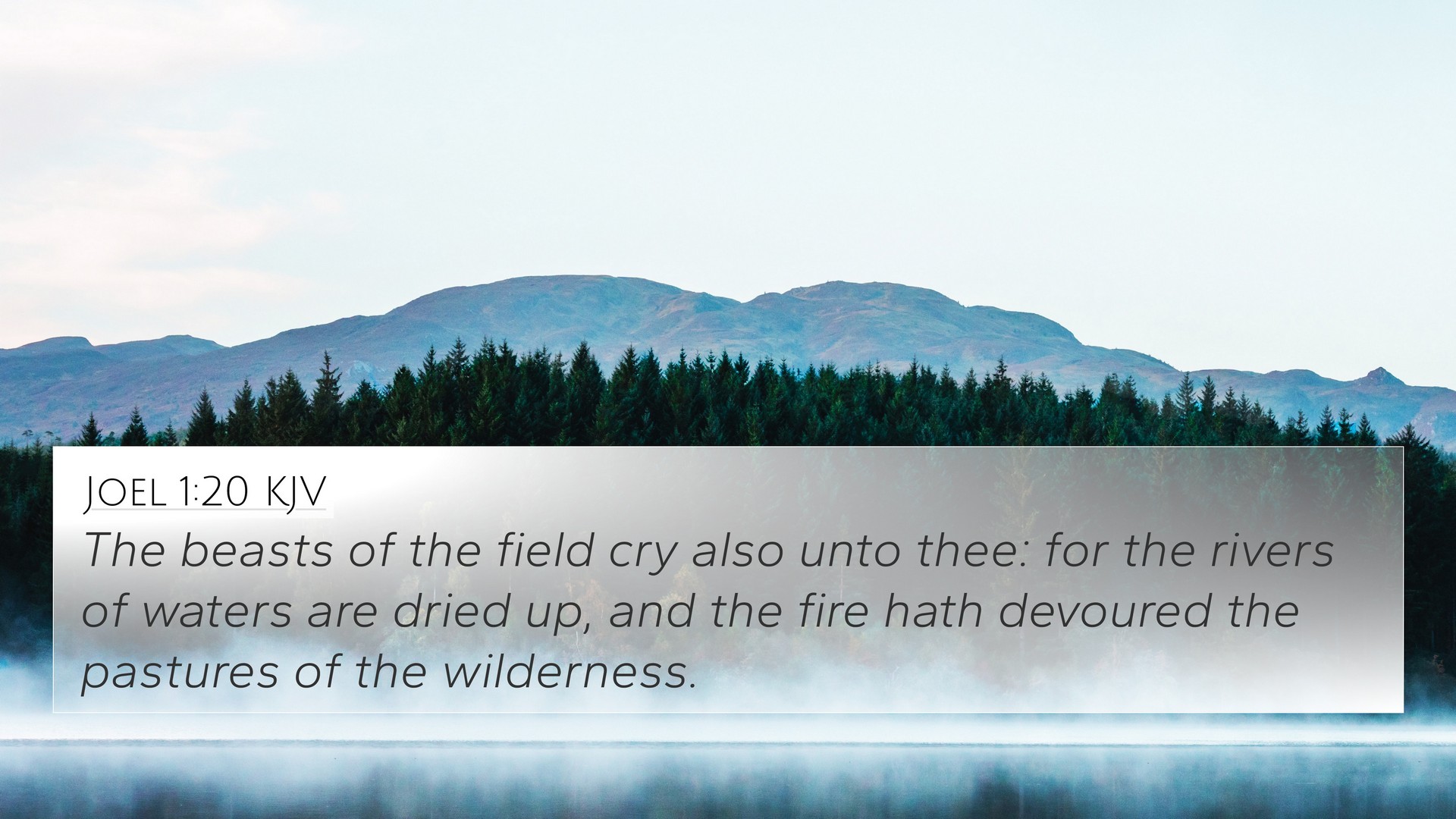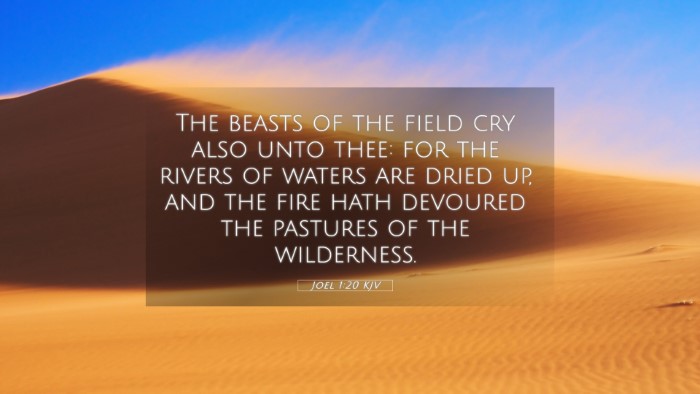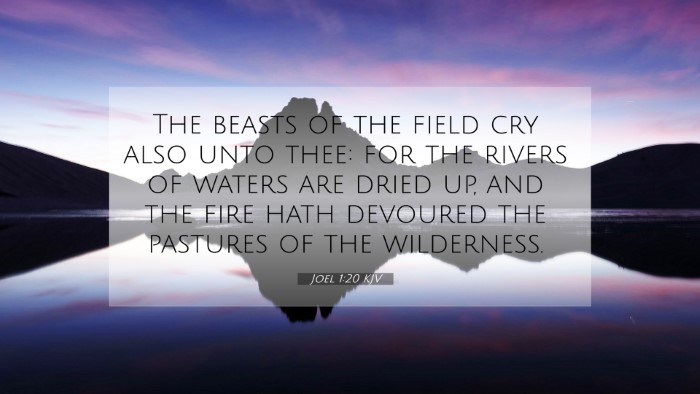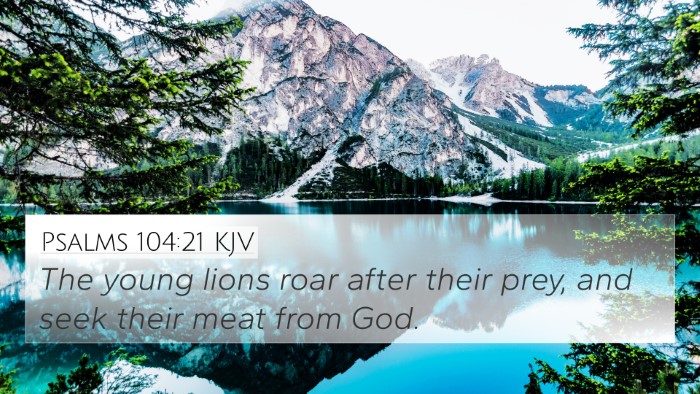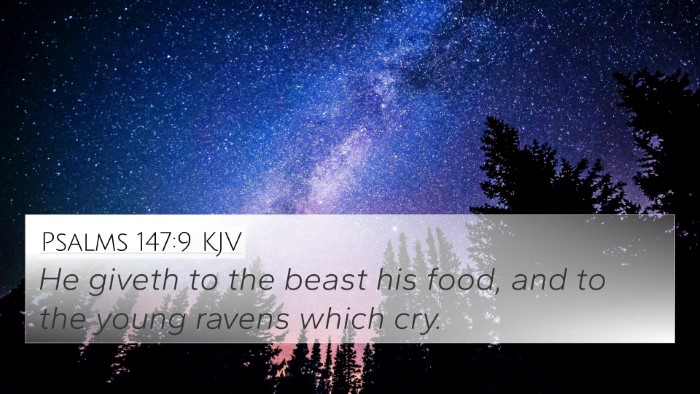Old Testament
Genesis Exodus Leviticus Numbers Deuteronomy Joshua Judges Ruth 1 Samuel 2 Samuel 1 Kings 2 Kings 1 Chronicles 2 Chronicles Ezra Nehemiah Esther Job Psalms Proverbs Ecclesiastes Song of Solomon Isaiah Jeremiah Lamentations Ezekiel Daniel Hosea Joel Amos Obadiah Jonah Micah Nahum Habakkuk Zephaniah Haggai Zechariah MalachiJoel 1:20 Similar Verses
Joel 1:20 Cross References
The beasts of the field cry also unto thee: for the rivers of waters are dried up, and the fire hath devoured the pastures of the wilderness.
Uncover the Rich Themes and Topics of This Bible Verse
Listed below are the Bible themes associated with Joel 1:20. We invite you to explore each theme to gain deeper insights into the Scriptures.
Joel 1:20 Cross Reference Verses
This section features a detailed cross-reference designed to enrich your understanding of the Scriptures. Below, you will find carefully selected verses that echo the themes and teachings related to Joel 1:20 KJV. Click on any image to explore detailed analyses of related Bible verses and uncover deeper theological insights.
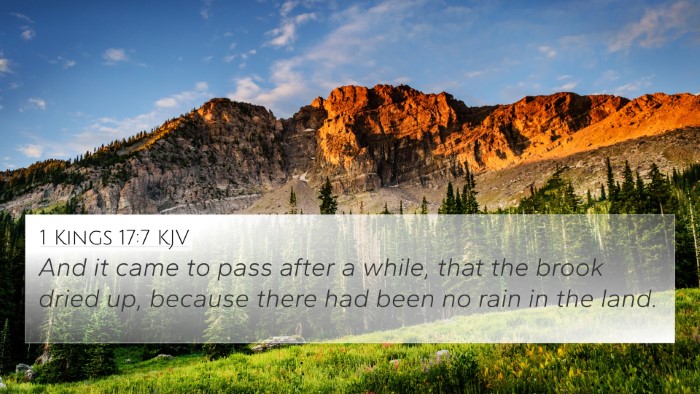
1 Kings 17:7 (KJV) »
And it came to pass after a while, that the brook dried up, because there had been no rain in the land.
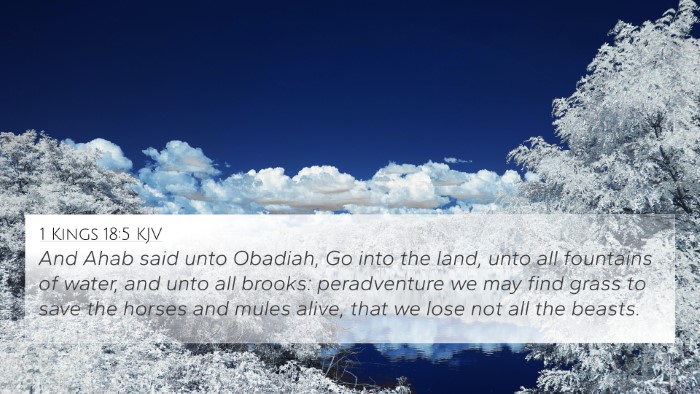
1 Kings 18:5 (KJV) »
And Ahab said unto Obadiah, Go into the land, unto all fountains of water, and unto all brooks: peradventure we may find grass to save the horses and mules alive, that we lose not all the beasts.
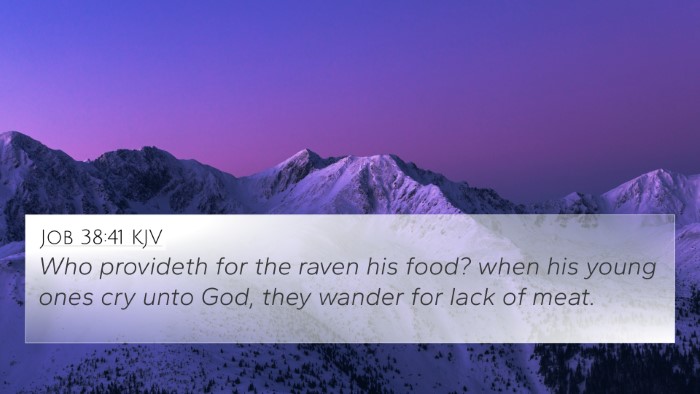
Job 38:41 (KJV) »
Who provideth for the raven his food? when his young ones cry unto God, they wander for lack of meat.
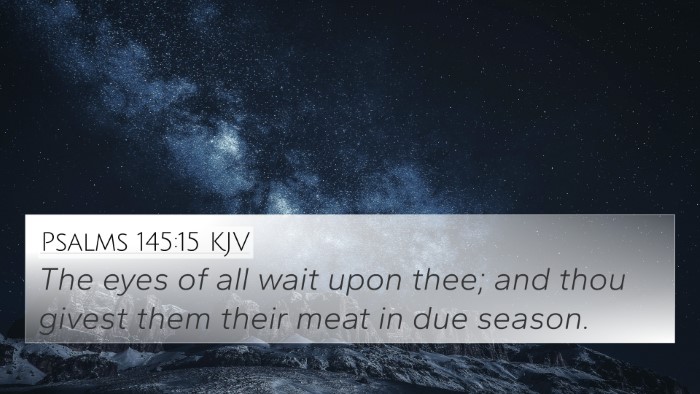
Psalms 145:15 (KJV) »
The eyes of all wait upon thee; and thou givest them their meat in due season.
Joel 1:20 Verse Analysis and Similar Verses
Understanding Joel 1:20
Joel 1:20 states:
"The beasts of the field cry also unto thee: for the rivers of waters are dried up, and the fire hath devoured the pastures of the wilderness."
Overview and Context
The Book of Joel is a prophetic text that addresses the consequences of sin, divine judgment, and the promise of restoration. Joel argues that the devastation experienced due to locust plagues and drought is a profound warning of the spiritual state of Judah. This verse highlights the suffering not just of humanity, but also of the animal kingdom, indicating the widespread impact of divine displeasure.
Commentary Insights
Insights from various commentaries provide valuable perspectives on this verse:
- Matthew Henry: Emphasizes the bleak situation where creation itself mourns alongside humans. The cry of the beasts symbolizes a universal lament at the judgment of God, which reminds us that all creation suffers due to human sinfulness and disobedience.
- Albert Barnes: Highlights the connection between the physical state of nature and spiritual conditions. Barnes suggests that the drying up of rivers and the devastation of pastures point to the consequences of straying from God's ways. The animals' cries represent both the physical suffering in nature and the spiritual desolation of the people.
- Adam Clarke: Draws attention to the imagery of fire consuming the fields, signifying destruction and judgment. Clarke interprets this as a call to reflection on the relationship between human actions and their repercussions on the environment, urging a collective return to righteousness.
Thematic Connections
This verse connects with numerous biblical themes and cross-references:
- Romans 8:22-23: "For we know that the whole creation groaneth and travaileth in pain together until now." This verse parallels Joel 1:20 in portraying creation's suffering due to humanity's sin, echoing the same theme of universal pain.
- Isaiah 24:4-6: "The earth mourneth and fadeth away." This prophecy similarly conveys the connection between human actions and natural desolation.
- Psalm 104:21: "The young lions roar after their prey, and seek their meat from God." This verse reflects God's care for creation, contrasting with the desolation in Joel's account.
- Matthew 24:7: "For nation shall rise against nation, and kingdom against kingdom: and there shall be famines, and pestilences, and earthquakes, in divers places." This New Testament prophecy underscores the prevailing theme of judgment during times of moral decay.
- 2 Chronicles 36:16: "But they mocked the messengers of God, and despised his words, and misused his prophets." This passage illustrates the human tendency to ignore divine warnings, leading to calamity.
- Job 12:7-10: "But ask now the beasts, and they shall teach thee; and the fowls of the air, and they shall tell thee." Job's reflections on creation echo the sentiment in Joel where animals become witnesses to the effects of human sin.
- Micah 1:10-11: Similar themes of destruction and desolation are found, reinforcing the interconnectedness of prophetic messages throughout the Old Testament.
Cross-Referencing Insights
This verse exemplifies the art of cross-referencing Bible texts, a valuable tool for deeper theological study. Here are some suggestions:
- Explore the connections between Old Testament prophetic literature (e.g., Amos and Micah) and their portrayal of divine judgment.
- Investigate the parallels between New Testament teachings on judgment and restoration (e.g., Jesus’ teachings on the last days).
- Use a Bible concordance to identify related verses and deepen your understanding of the common themes of judgment and lament.
Application and Reflection
Joel 1:20 encourages readers to reflect on their relationship with God and the consequences of their actions on the world around them. It prompts an examination of:
- How personal and communal sins can lead to physical and spiritual desolation.
- The role of creation in expressing God’s signals about the state of human affairs.
- The hope for restoration through repentance and drawing closer to God.
Conclusion
In summary, Joel 1:20 serves as a powerful reminder of the interconnectedness between humanity and all of creation. It calls for an awareness of the consequences of sin and emphasizes the need for a return to righteousness. By utilizing tools for Bible cross-referencing, believers can enrich their understanding and uncover the profound connections within Scripture.
